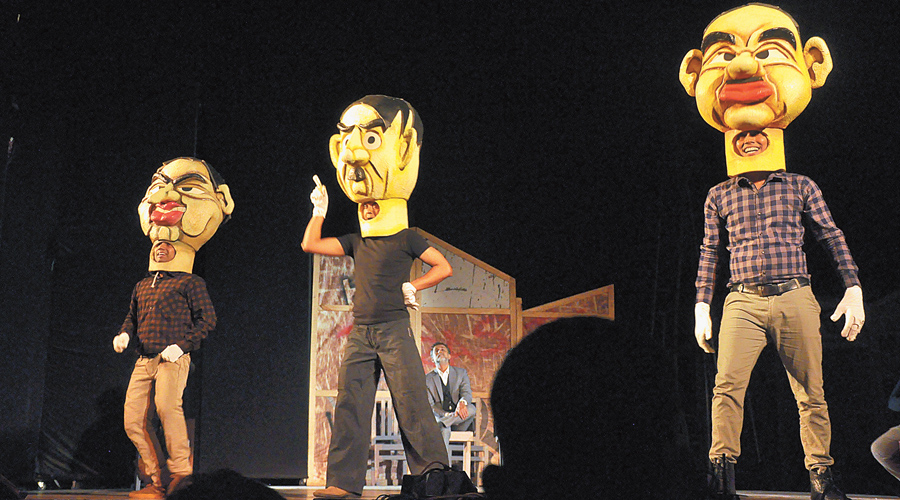Ace director Suman Mukhopadhyay has done it again. Recalling the phenomenal response to his first staging of Mephisto during the Gujarat riots of 2002, he has presented a completely new version of the play last Wednesday to underline the do or die election in Bengal.
The political message of the play is straight and simple — support the inclusive and secular, not the divisive and sectarian.
Fascists and semi-fascists are mortally afraid of thinkers, intellectuals, creative writers and artists. They try their best to bludgeon them into abject submission; or, they simply try to eliminate them.
How can we, even after so many years, forget the irrefutable fact that the great poet, Federico Garcia Lorca, was eliminated by General Franco, the military-fascist ruler of Spain? While Lorca was gunned down, pivotal German writers like Thomas Mann, Bertolt Brecht and many others had to leave their country to save themselves and their creativity.
Indeed, this despicable tradition of Fascism found yet another malignant voice in Calcutta last week when the abrasive BJP leader, Dilip Ghosh, threatened: “Let them be busy with acting and singing. That we shall tolerate. But if they try to engage in politics, we shall rub them severely, and we know how to rub.”

Mephisto (left), played by Anirban Bhattacharya, with his political boss who is directing him every moment
Still, stubborn poets, singers, artists and intellectuals simply refuse to be cowed down. Rejecting Dilip Ghosh’s horrendous threat, they staged the memorable and evergreen anti-fascist play Mephisto at Rabindra Sadan on Wednesday evening.
This play has a glorious history. Not only was it performed in Berlin and other German cities in the turbulent 40s of the last century, but also in this very city when the scandalous pogrom in Gujarat was advancing in the first decade of the present century. The hall was packed that afternoon at the Academy of Fine Arts and everyone greeted the director and the artistes after they had put up a splendid performance.
I pointedly requested the illustrious director of the drama staged last Wednesday, Suman Mukhopadhyay, to comment on the searing relevance of the play here and now.
Suman replied: “We were overwhelmed by the fervent response when it was staged when Gujarat was burning in 2002. Now, in the present-day reality, the relevance of Mephisto is again being felt acutely. That is why we have staged it again to forewarn people of the impending catastrophe, if it genuinely occurs.”
When I asked him to comment on Dilip Ghosh’s diatribe and outspoken threat, his firm answer was: “We refuse to be disturbed by what he spouts. Let him try to rub us in the wrong way severely, but we shall persist with our creative protest. We and the fully packed auditorium are not bothered in the slightest by his threat.”
The play itself, based on a novel bearing the same title and written by Klaus Mann (son of Thomas Mann), depicts how a superb and ambitious actor gradually succumbs to the Nazi power-machine.
His downward slide marked by growing servility is brilliantly dramatised. Moreover, Anirban Bhattacharya gave a stellar performance in the role of Mephisto, the submissive and purchased protagonist.
As we watched the dramatic performance, one scene unfolding onto the other — we could not but compare our own situation with the one graphically etched in the play. The message also was clear and distinct: “Resist now or never. Eliminate the evil power which wants to stifle us into submission, without any further delay.”
The Calcutta audience, when it first saw the play, during the Gujarat massacre was thoroughly charged. So also on Wednesday – the huge auditorium of Rabindra Sadan was full to the capacity and each and every face reflected a stern promise, which said, “No more, that’s enough”.
The thunderous ovation which followed the end of the play clearly showed on which side the audience stood.
The half-educated purveyors of Fascist culture in our state and country have clearly forgotten (or perhaps they are unaware of) the basic premise that the unsullied aesthetic dimension is always layered with the flow of redemptive politics. In point of fact, creativity and intellect cannot thrive without the indispensable political accent. And, precisely, this accent was heard and felt on Wednesday at Rabindra Sadan.
The play will be repeated on 17th this month at Girish Mancha and on 23rd at Madhusudan Mancha.
This month is crucial for us in Bengal. We have the golden opportunity and chance to reject Golwalkar, Godse et al. Shall we do it? The play, on its part, reminds us of our own responsibility and simply urges us to do the needful in the polling booths.











